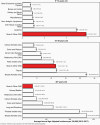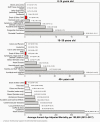CBTRUS Statistical Report: Primary Brain and Other Central Nervous System Tumors Diagnosed in the United States in 2013-2017
- PMID: 33123732
- PMCID: PMC7596247
- DOI: 10.1093/neuonc/noaa200
CBTRUS Statistical Report: Primary Brain and Other Central Nervous System Tumors Diagnosed in the United States in 2013-2017
Erratum in
-
Corrigendum to: CBTRUS Statistical Report: Primary Brain and Other Central Nervous System Tumors Diagnosed in the United States in 2013-2017.Neuro Oncol. 2022 Jul 1;24(7):1214. doi: 10.1093/neuonc/noaa269. Neuro Oncol. 2022. PMID: 33340329 Free PMC article. No abstract available.
Abstract
The Central Brain Tumor Registry of the United States (CBTRUS), in collaboration with the Centers for Disease Control (CDC) and National Cancer Institute (NCI), is the largest population-based registry focused exclusively on primary brain and other central nervous system (CNS) tumors in the United States (US) and represents the entire US population. This report contains the most up-to-date population-based data on primary brain tumors (malignant and non-malignant) and supersedes all previous CBTRUS reports in terms of completeness and accuracy. All rates (incidence and mortality) are age-adjusted using the 2000 US standard population and presented per 100,000 population. The average annual age-adjusted incidence rate (AAAIR) of all malignant and non-malignant brain and other CNS tumors was 23.79 (Malignant AAAIR=7.08, non-Malignant AAAIR=16.71). This rate was higher in females compared to males (26.31 versus 21.09), Blacks compared to Whites (23.88 versus 23.83), and non-Hispanics compared to Hispanics (24.23 versus 21.48). The most commonly occurring malignant brain and other CNS tumor was glioblastoma (14.5% of all tumors), and the most common non-malignant tumor was meningioma (38.3% of all tumors). Glioblastoma was more common in males, and meningioma was more common in females. In children and adolescents (age 0-19 years), the incidence rate of all primary brain and other CNS tumors was 6.14. An estimated 83,830 new cases of malignant and non-malignant brain and other CNS tumors are expected to be diagnosed in the US in 2020 (24,970 malignant and 58,860 non-malignant). There were 81,246 deaths attributed to malignant brain and other CNS tumors between 2013 and 2017. This represents an average annual mortality rate of 4.42. The 5-year relative survival rate following diagnosis of a malignant brain and other CNS tumor was 23.5% and for a non-malignant brain and other CNS tumor was 82.4%.
© The Author(s) 2020. Published by Oxford University Press on behalf of the Society for Neuro-Oncology. All rights reserved. For permissions, please e-mail: journals.permissions@oup.com.
Figures


























References
-
- Louis D, Wiestler O, Cavanee W, eds. WHO Classification of Tumours of the Central Nervous System. Lyon, France: International Agency for Research on Cancer; 2007.
-
- Centers for Disease Control and Prevention (CDC). National Program of Cancer Registries Cancer Surveillance System Rationale and Approach.1999; http://www.cdc.gov/cancer/npcr/pdf/npcr_css.pdf. Accessed July 21, 2020.
-
- Wiśniewski JR, Zougman A, Nagaraj N, Mann M. Universal sample preparation method for proteome analysis. Nature methods. 2009; 6(5):359-362. - PubMed
MeSH terms
LinkOut - more resources
Full Text Sources
Other Literature Sources
Medical

